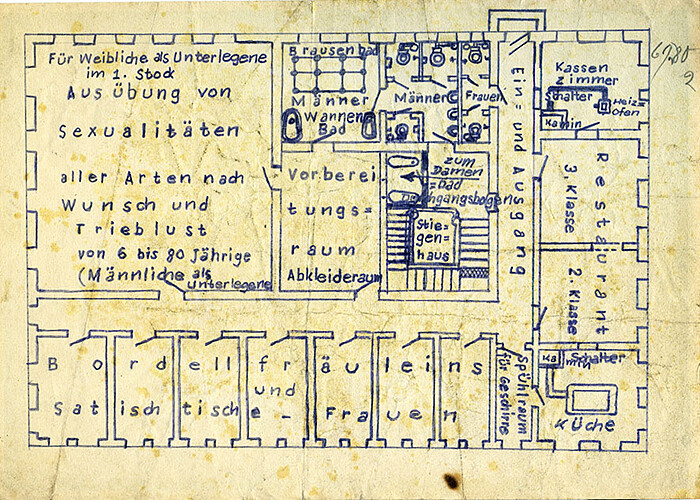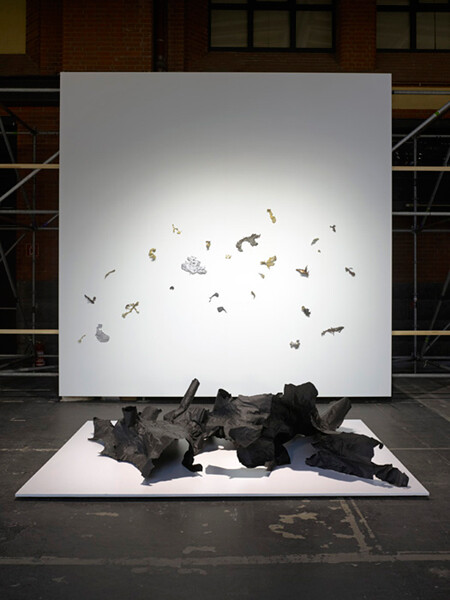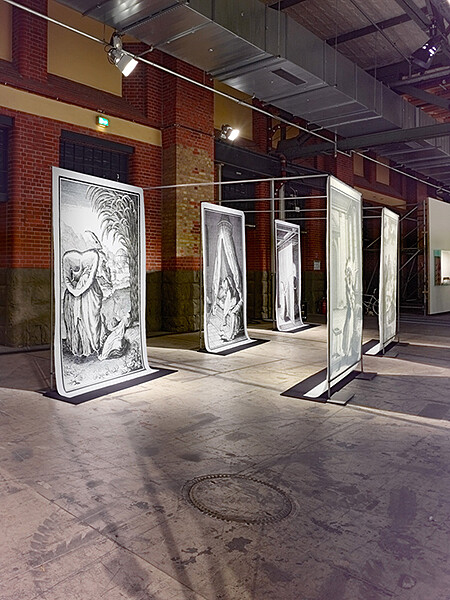Many find the enigmatic or a little game of playing coy just irresistible. And what attracts people in humans also goes for, well, things arty. Why else would the question of whether abc—art berlin contemporary—is an art fair or not come up over and over again, since its foundation five years ago? This year’s opening press conference attempted to resolve this mystery once and for all: apparently, abc is a “new format” and a “private initiative,” or so say executive directors Alexander Schröder and Guido Baudach. In their words, abc is not a fair, as it is not embedded into a corporation or overarching fair organization. But regardless of whether it qualifies for the label “fair” or not—this year, abc is an attitude. It is a reflection, or rather a conjuring up of a particular Berlin spirit. Casual, cool, chaotic, international. Different.
Being different is key to abc. Not only is its organizational structure distinct from that of a “proper fair,” but so are its appearance and its concept. Founded by nine Berlin-based galleries as an alternative to the art forum (Berlin’s contemporary art fair, which after a fifteen year-long run, called it quits last year), abc came in the guise of a theme show, each year under a different curatorial banner (in order of appearance: sculpture, public art, film, painting). Having hacked off those genres, abc now finds itself at center stage as the main commercial event in the second half of the year, having let go of a somewhat awkward and slightly forced curatorial notion to look more like, yes, a young art fair. Liberated from an overall concept and how it relates to certain positions (another alluring mystery in previous years), we are now free to direct our attention to the art itself. As are the dealers. Anything goes. From the colorful in-your-face flatness of an Aaron Curry (VeneKlasen Werner) or the crude expressiveness of Max Brand at Jacky Strenz to the discreet, disturbed and private worlds of Martin Erhard and his fantastic psycho-architectural drawings at Susanne Zander. From Michael Joo’s color-bombed police riot shields at Blain Southern to Mariana Castillo Deball’s pitch black papier-mâchéd tree trunks at Wien Lukatsch. (Bringing her to abc, was a lucky choice for the gallery, as Castillo Deball had just been nominated for the short list of the 2013 Preis der Nationalgalerie für Junge Kunst.)
One of the strong points of abc is its focus on individual artistic presentations that sometimes resemble condensed solo shows, like Sofie Bird Møller’s corridor of large repainted prints of an 18th century manuscript. She turns allegories on the mysticism of love into slightly eerie, “Une semaine de bonté”-style riddles (at Sassa Trülzsch). Or like Marcel Frey’s furniture-gone-sculpture objects that sit on concrete floor tiles à la Carl André to form an ensemble of contented, quietly self-reflexive geometrical beings (at Galerie Thomas Fischer). Esther Schipper brought along Christoph Keller’s 2002 Expedition-Bus and Shaman-Travel, an epitome of spiritual, anthropological, otherworldly, imaginative journeys. Found footage from 1950s and 1960s ethnographic films are projected onto the inside windshield of an old VW van, itself a vehicle of hippie dreams and affordable camping tours (at least for Germans). And at Johnen Galerie, Jeff Wall combined his wonderful photographic series on the costume historian Claus Jahnke (who focuses on fashion from former Jewish-owned department stores in Berlin) with vintage dresses from Jahnke’s collection, thus creating a space of remembrance and a touching memorial.
Sitting in Keller’s van or taking in the intricate detail of Martin Erhard’s drawings was a bit of a relief amongst the buzz and visual overload of the abc, as there is no conventional fair architecture marking out the boundaries of individual booths. Galleries can choose whether they want to have (and pay for) walls or construction-site fencing or neither of the above. This created, especially in the first hall, a rather overwhelming visual cacophony.
Wentrup Gallery, for example, had the good idea of bringing along their own architecture by re-installing Timm Ulrichs’s Konzert der Türen (1995/2012), a wooden skeleton maze structure in which doors open for you, while their squeaking and creaking is transmitted and amplified via loudspeakers. Ulrichs, an iconic figure of post-60s Germany, is a self-declared “Totalkünstler” (total artist)—but don’t think along the lines of Jonathan Meese: think subtlety, think of a finer etched out sense of humor. Ulrichs wasn’t the only highlight from a slightly older generation of artists. Isabella Bortolozzi featured a powerful abstract painting by Carol Rama (La guerre à astratta, 1970) alongside a number of more recent etchings. Reception presented some pretty wild, figurative assemblages by HP Zimmer from the 1970s and 1980s, while Helmut Federle’s paintings at Galerie nächst St. Stephan Rosemarie Schwarzwälder demonstrated that one need not be afraid of gold and black.
Among the 129 participating galleries, almost exactly half of them came from places other than Berlin. There is no open application process; the abc organization committee grants invitations based on the only criterion that is publically communicated: “quality.” There were quite a considerable number of Vienna’s major dealers, even though the city’s own Viennafair is about to start next week. Abc is a mostly Western European event, with the odd participant from Hong Kong or Cape Town, four galleries from New York as well as from Dubai—with Carbon 12 featuring recent textile assemblages by Sara Rahbar that negotiate imagery of war and nationalism in the formal language of a Robert Rauschenberg—and even a gallery from Jeddah, Saudia Arabia. The absence of dealers from Central or Eastern Europe—with the exception of Svit from Prague—is quite painfully felt, and apparently, a few galleries from that part of the world turned the invitation down. It is a shame that, over the years, neither art forum nor abc were able to establish stronger links with Berlin’s Eastern neighbors. And if the choice of the guest of honor says something about the host’s aspirations, then abc is currently aiming for the New York touch, with Artists Space curating a so-called adjunct program around notions of cultural production—including publishers, record labels or designers—that was very aptly and revealingly naming “Bazaar.”
Still, abc felt dominated by the local scene. This is actually reassuring as Berlin dealers weren’t always that supportive of the art forum. And this is also, of course, in many instances due to logistics and expenses, and even more so, if you partake in an art market that is not exactly known as a, say, profit-bearing activity. Against this background, the large number of non-Berlin galleries indicates quite a level of hope and trust into the potential of abc and the newly established Berlin Art Week, a label and initiative that is to bundle the forces (I guess that’s how you call it in PR speech) of Berlin’s public institutions and commercial initiatives, to attract collectors from near and far. For abc, now the leading event of the autumn, this must be an uneasy, if not impossible, position to be in. Much of the attraction of Berlin’s Gallery Weekend in the spring lies in the event’s Berlin-ness, and abc clearly understands the importance of image and attitude, of Berlin’s hipness factor as a USP. However, abc will inevitably have to become more transparent with regards to its admission policy, meet economic expectations, and possibly adopt more features of “real art fairs.” The decision-makers of abc seem to have taken that path already, with the appointment of Maike Cruse as director just a few days ago. To renounce some power and to let some of that posturing go would seem quite an acceptable price for abc to pay if that would help to make Berlin not only a cool, but also a viable place for the arts and its proponents.







